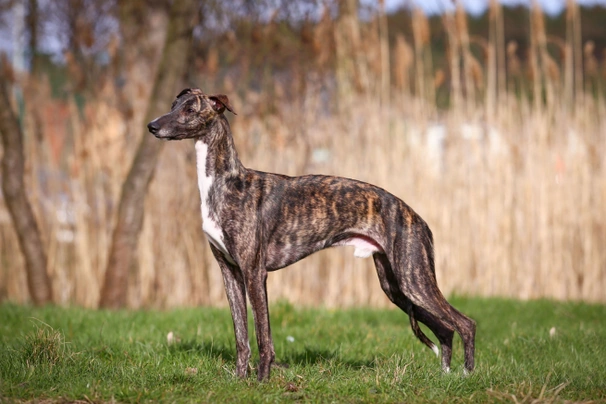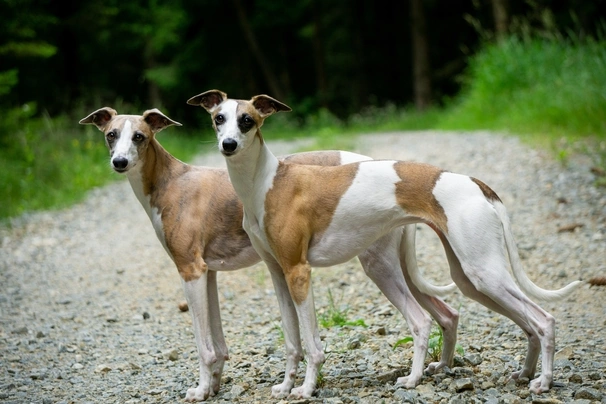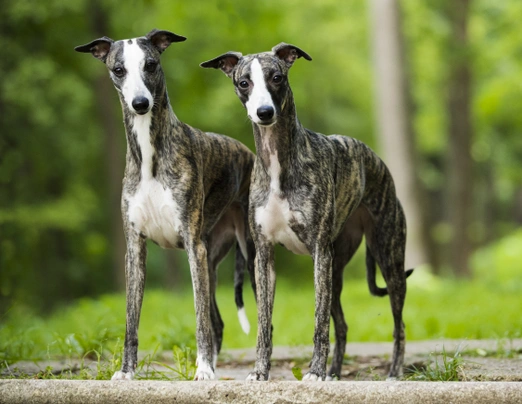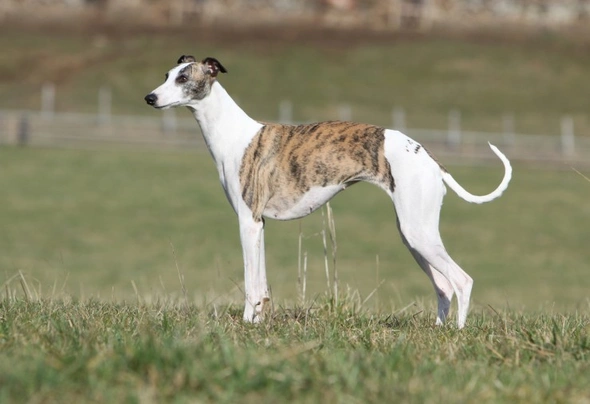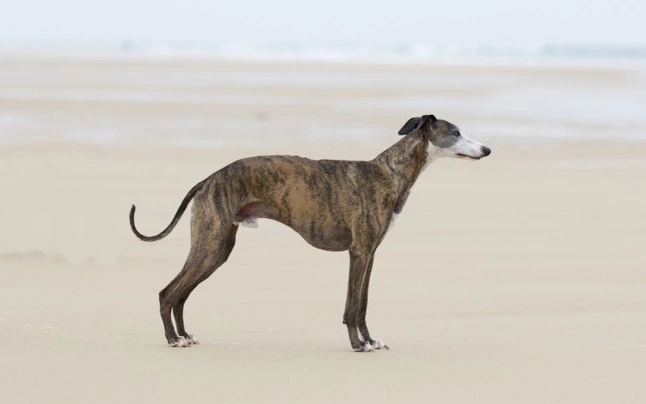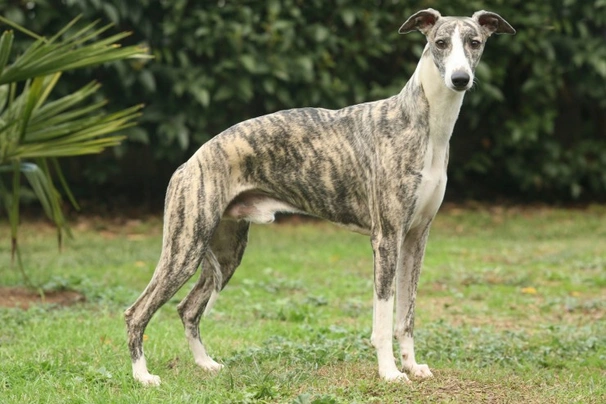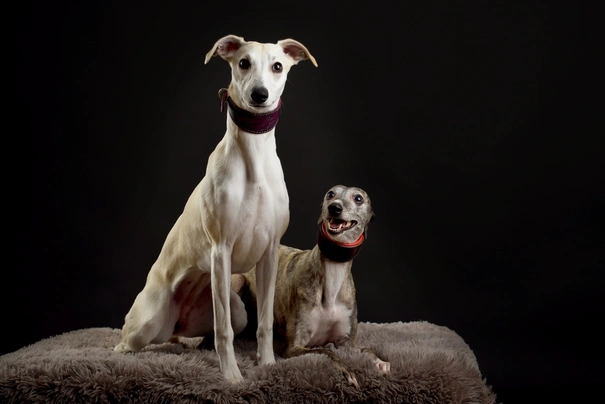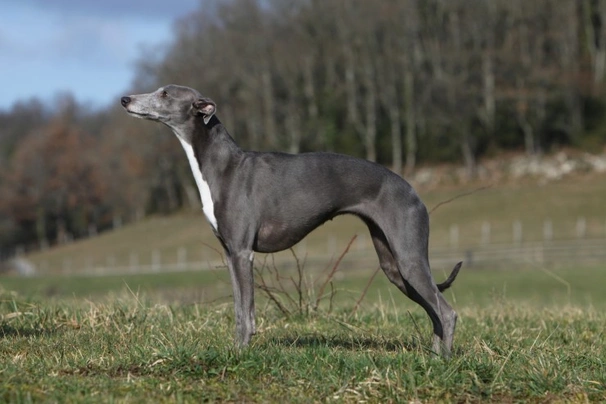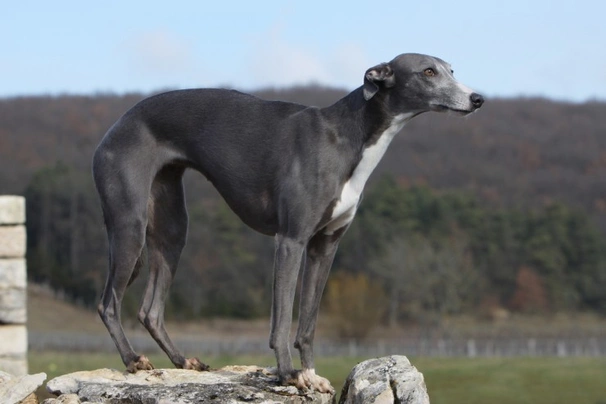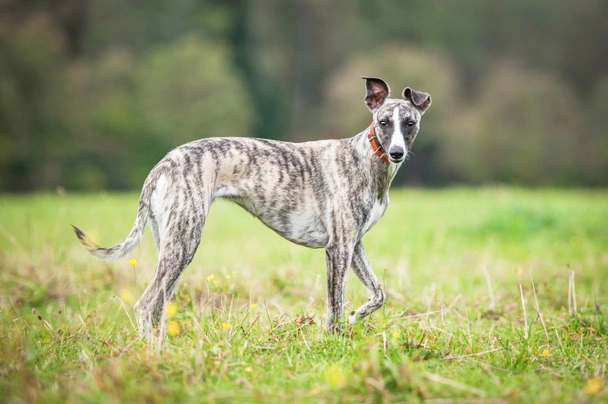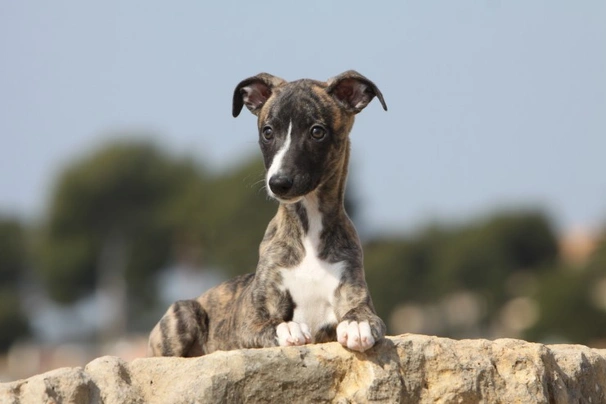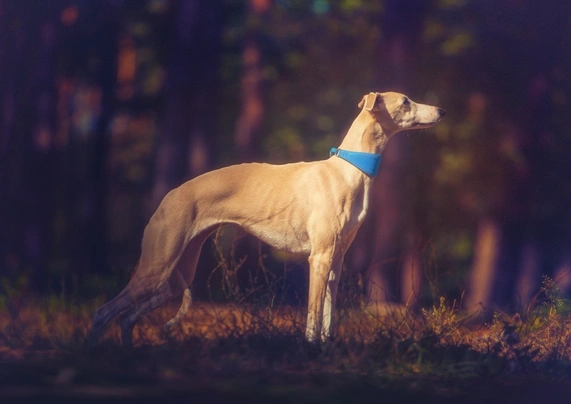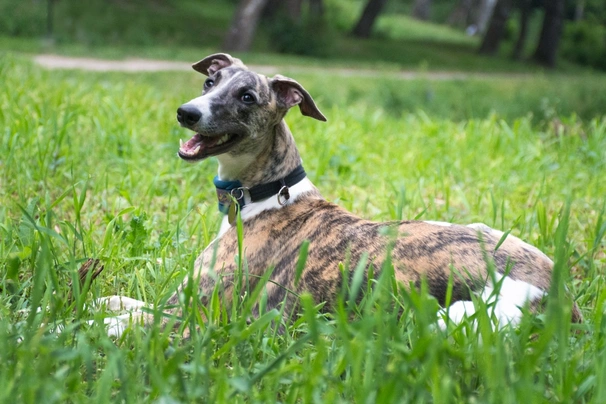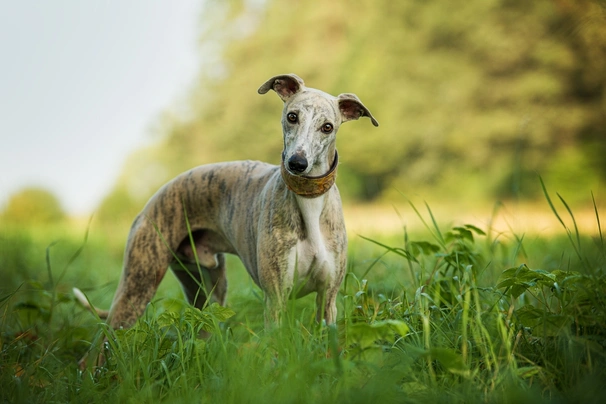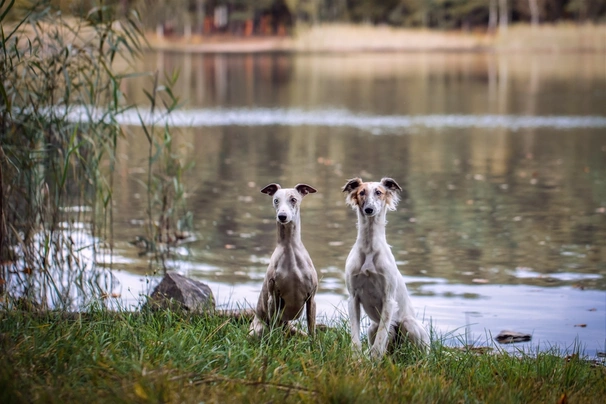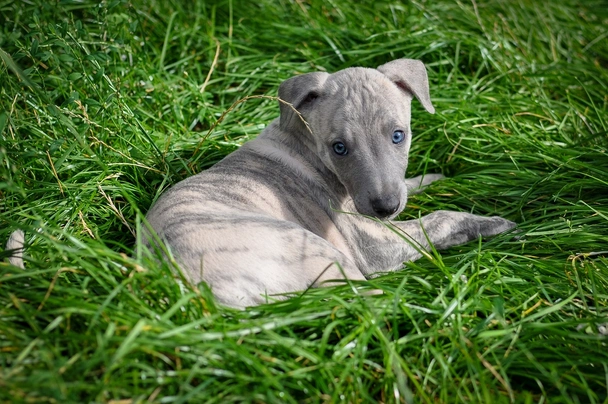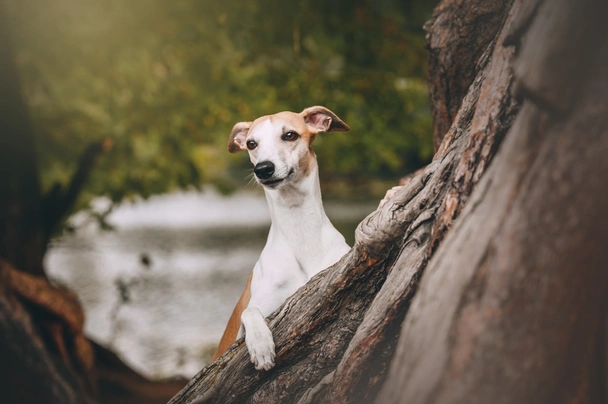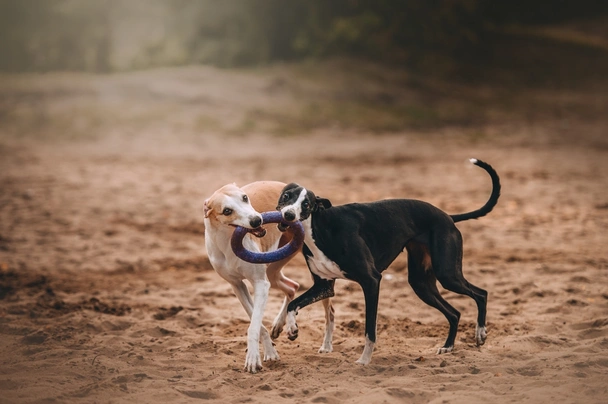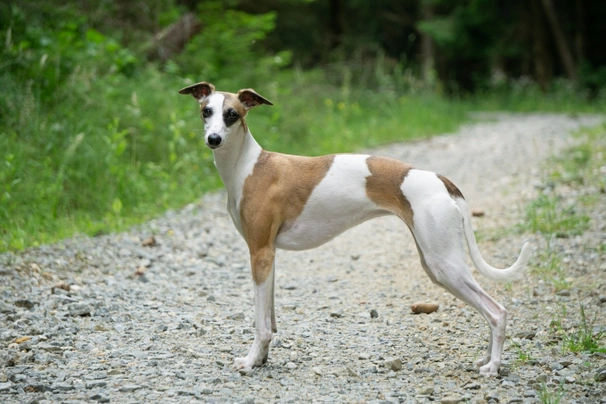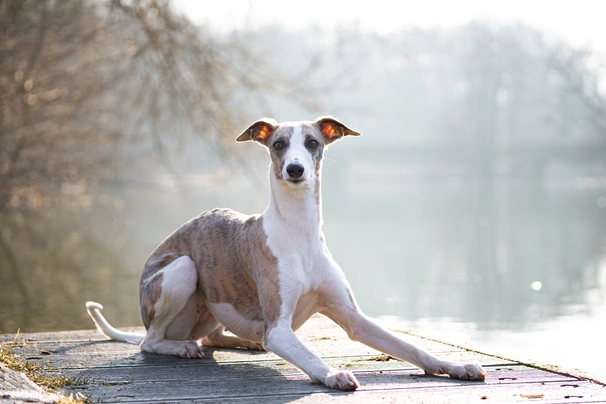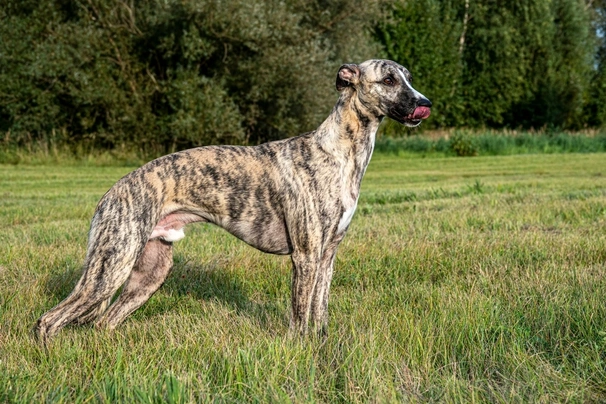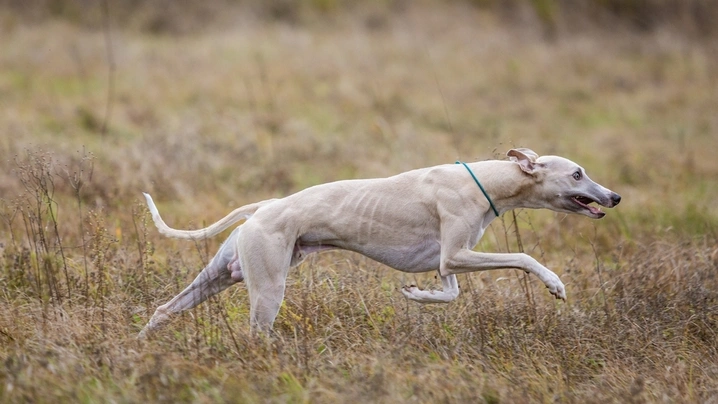Whippet
Pros
Cons
Introduction of the Whippet
The Whippet is the smaller relation of the Greyhound and was originally bred as a coursing hound. Over the years these slight elegant dogs have proved themselves to be extremely good at their job becoming a firm favourite with many people throughout the country and elsewhere in the world. Also known as the "Snap Dog" whippets are capable of running very fast with records of them reaching 56 km/h miles when in full flight which in short means they are superb racing dogs.
They are gentle characters by nature and are known to be one of the cleanest dogs around but with this comes the "hound" in them which in short means that a Whippet would feel the need to chase anything that moves. They thrive on human company and are highly adaptable being just at home in a country house or large castle as they would be living in a smaller house providing there is a very secure back garden for them to safely let off steam as often as possible. They are one of the most popular sporting-type dogs on the planet for these very reasons with Whippets being high on the list of favourite family pets and companions in the UK.
History of the Whippet
The actual origins of the Whippet are a little obscure although it is known that "whippet-type" hounds have been around and highly prized in Britain for centuries. In Medieval England large and small hounds were popular and it is thought that the smaller greyhound could well be the ancestor of the Whippets we know and love today.
Whippets became very popular by the 1900s both in Europe and the UK particularly in the Midlands as well as Northern England where they were bred to race and they were given their name from an old English word that meant "quickly moving little dog". They were highly prized by the mining community for their speed which saw these elegant hounds being raced right up until WWI a time when Whippet racing was a lot more popular than Greyhound racing in the UK.
It is thought the breed was developed by crossing several sporting racing and coursing breeds including the Greyhound. The Whippet Club was established in 1899 which was the first in the world to be founded and the oldest in the country today. They were recognised as a separate breed by the Kennel Club in the late nineteenth Century and today Whippets are just as popular both on the race track as working dogs and they are hugely popular as family pets and companions too. These elegant slight dogs also prove themselves to be very good at obedience and agility which they thoroughly enjoy taking part in because they thrive on the one-to-one attention they get when training.
Interesting facts about the breed
- Is the Whippet a vulnerable breed? No they are among the most popular breeds in the UK
- Whippets are incredibly fast and can reach speeds of up to 56km/h
- The breed can be traced right back to the 1600's
- It is thought they got their name from a word that's no longer used that means to "move briskly"
- At one time Whippets were thought of as being a "poor man's" Greyhound
- Whippets were a firm favourite with poachers because of their speed loyalty and extremely good hunting skills
- They were once highly prized coursing hounds
- Whippets need to be kept warm in the winter because they feel the cold
Appearance of the Whippet
Height at the withers: Males 47 - 52 cm Females 44 - 47 cm
Average weight: Males 9.1 - 19.1 kg Females 9.1 - 19.1 kg
Whippets are elegant yet powerful muscular yet athletic looking dogs that show a great of grace giving the impression of being capable of great speed. They boast having long lean heads that taper nicely to their muzzle and a slight stop. There is a nice width between a dog's eyes and their jaws are clean-cut and powerful. Noses are black although dogs with blue coats have bluish noses cream coated dogs can have liver noses particolours and white coated dogs can have a butterfly nose.
Eyes are oval shaped with dogs always boasting a bright and expressive look in them. Their ears are rose shaped small and fine in texture. Whippets boast having a strong jaw with a perfect scissor bite where their upper teeth neatly overlap their lower ones. Their necks are long and well-muscled with dogs carrying them elegantly arched. Shoulders are well laid back with a moderate space between a dog's shoulder blades at their withers. Front legs are straight with dogs standing very upright.
The Whippet has a very deep chest and brisket with a well-muscled broad firm and longish back that gracefully arches over their loin. Ribs are well sprung which adds to a dog's powerful yet elegant look with bellies being nicely tucked up. Hindquarters are strong and powerful with a broadness across the thighs and well-muscled second thighs. Feet are oval shaped and well split up between each of a dog's toes with well arched knuckles and strong nails with dogs boasting thick pads. Whippets do not have any feathering on their tails which are long tapering to the tip which dogs carry with a delicate curve in them.
Whippets have fine single coats and as such they need more protection against the elements in cold weather. In short they need to wear warm dog coats so they don't get cold. The accepted breed colours for Kennel Club registration are as follows:
- Black
- Black & White Particolour
- Black & White Trim
- Black Brindle
- Black Brindle White Trim
- Blue
- Blue Brindle
- Blue Brindle Particolour
- Blue Brindle White Particolour
- Blue Brindle White Trim
- Blue Fawn
- Blue White Particolour
- Blue White Trim
- Brindle
- Brindle & White Particolour
- Brindle White Trim
- Cream
- Fawn
- Fawn Black Mask
- Fawn Black Mask White Trim
- Fawn Blue Mask
- Fawn Brindle
- Fawn Brindle White Particolour
- Fawn Brindle White Trim
- Fawn White Particolour
- Fawn White Trim
- Red Brindle
- Red Brindle Particolour
- Red Brindle White Trim
- Red Fawn
- Red Fawn & White Particolour
- Red Fawn Black Mask
- Red Fawn Black Mask White Trim
- Red Fawn White Trim
- Silver Brindle
- Silver Brindle & White Trim
- Silver Brindle Particolour
- White
- White & Blue Brindle
- White & Fawn Particolour
Gait/movement
When a Whippet moves they do so with a tremendous amount of free-moving action with long and easy strides covering a lot of ground while at the same time holding their topline. They throw their front legs forward low to the ground and their hind legs travel well under their bodies which gives Whippets a tremendous amount of power from their hindquarters. Their gait should never be high stepping or stilted and neither should it be mincing or short.
Faults
The Kennel Club frowns on any exaggerations or departures from the breed standard and the seriousness of the fault would be judged on how much it affects a Whippet's overall health and wellbeing as well as their ability to perform.
Male Whippets must have both testicles fully descended into their scrotums and it is worth noting that the size of a Whippet can be a little smaller or slight bigger as well as being a little taller or slightly shorter than stated in their Kennel Club breed standard which is to be used only as a guide for the breed.
Temperament of the Whippet
The Whippet is a very loving and gentle dog in a home environment but they are "hounds" and therefore have a tremendously strong prey drive. In short if a Whippet spots something moving in the distance they will chase after it without a second thought. Back gardens must be ultra-secure to keep a Whippet safely in even when they are puppies.
As previously mentioned whippets thrive in a home environment and are just as happy to lie on a couch with the people they love after having been given a lot or vigorous exercise. They love being involved in everything that goes on around them which includes playing interactive games which they will happily join in. Whippets like all other sight hounds are sensitive sophisticated and independent characters all rolled into a very elegant and devoted companion and family pet.
Whippets are generally quiet and gentle dogs but can sometimes be nervy and shy if not well socialised from a young enough age or when they have not been given the best start in life. It cannot be stressed enough the importance of introducing Whippets to new situations lots of people and other animals so they grow up to be confident adult dogs. They are often wary of strangers and will bark if they feel they are being threatened in any way but rarely would a Whippet show any sort of aggressive behaviour preferring to keep their distance until they get to know someone.
They are active dogs and providing they are given enough vigorous daily exercise they are happy to turn into couch potatoes once they get home. However when out on a walk Whippets show a different side to their natures and should only be allowed off the lead in a safe and secure environment or they may just decide to take off after a small animal they spotted in the distance**.** With this said rarely would a Whippet not eventually come back to their owners.
A Whippet's training must start early paying special attention the "recall" command. Their education must be consistent and always fair because these slight dogs are sensitive by nature and do not respond well to any sort of harsh correction or heavier handed training methods. Whippets need to be handled with a gentle yet firm hand for them to respond well bearing in mind that many of these slight dogs can be quite highly strung.
With this said Whippets are a good choice for first time owners because in the right hands and with the correct amount of exercise and gentle training these charming elegant dogs become valued and devoted members of a family. Because they form such strong ties with their owners Whippets never like to be left on their own for any great length of time which in short means they are better suited to households where one person stays at home when everyone else is out or with people who work from home.
Are they a good choice for first time owners?
Whippets are a good choice for first time dog owners providing they have enough time to dedicate to training their canine companions because although intelligent Whippets are not as fast at learning new things. As previously mentioned they are better suited to homes where one person is usually around so they are never left on their own for too long.
What about prey drive?
Whippets were bred to course hunt and race which are traits that are deeply embedded in their psyche and they therefore have an extremely strong prey drive. A Whippet is never happier than when they get to chase something which is why they excel at so many canine sporting activities other than racing.
What about playfulness?
Whippets are playful by nature and enjoy it when they can join in any family fun and games. Care should always be taken to ensure that playtime never turns to boisterous especially if there are children in the household.
What about adaptability?
Whippets are adaptable but because they enjoy running free off their leads as often as possible they are not as adaptable as many other breeds. As such they are better suited to living with people who have back gardens whether in the town or in the country and not really suited to apartment living which would prevent a Whippet from being to express themselves as they should.
What about separation anxiety?
Whippets form strong bonds with their families and they are never happy when they find themselves on their own for any length of time which often sees them suffer from separation anxiety. The result is that many Whippets develop unwanted and destructive behaviours around the home which is their way of showing how stressed out they are at being left to their own devices.
What about excessive barking?
Whippets are not known to be "barkers" thanks to the fact they are "silent" hunters. With this said any dog that's unhappy or which has been left on their own for too long would start barking incessantly which is their way of trying to get attention and to let the world know how stressed out they are.
Do Whippets Like Water?
Whippets like swimming and will happily take to the water when the weather is warm. Some dogs however don't like to get their feet wet and it would be a mistake to force them in because it would just end up frightening them even more. Anyone who shares a home with a Whippet that loves water should take great care when walking their dog off their lead anywhere near more dangerous watercourses just in case their canine companion decides to leap in.
Are Whippets good watchdogs?
Whippets are not natural watchdogs although they would always let an owner know when there are strangers about or when something they don't especially like is going on around them.
Intelligence / Trainability of the Whippet
Whippets are clever dogs but they can be hard to train simply because they are not as "quick" to learn new things like other breeds. As such it takes a bit more time and a lot of patience on the part of an owner when it comes to training a Whippet to do new things. They do not respond well to any sort of harsh correction or heavy-handed treatment and need to be handled fairly and gently when they are being trained to achieve good results because like all sighthounds they are sensitive dogs by nature.
In the right hands and with the right sort of guidance Whippets can be trained to take part in obedience competitions and agility both of which are activities they thoroughly enjoy. The old adage of a "tired dog being a good dog" is never truer than when describing a well exercised and content Whippet once they get home.
Their education and training must start early paying a lot of attention to the "recall" command right from the word go. Other basic commands a Whippet puppy should be taught includes the following:
- Sit
- Stay
- Down
- Leave it
- Heel
- Quiet
- Bed
Children and other
The Whippet is a great choice as a family pet because they are known to calm and gentle around children. However they are more suited to families where the children are older and therefore not the best choice for people with toddlers. Any interaction between the children and a dog should be supervised by an adult to make sure playtime does not get too rough or boisterous. Loud noises and raised voices tend to make Whippets quite nervous so best avoided.
Care should be taken when Whippets are around cats and other small animals because of their high prey drive although if they have grown up with a cat in the home they generally get on well together. It would be a mistake to trust a Whippet with and other small pets in a household just to be on the safe side though.
Health of the Whippet
The average life expectancy of a Whippet is between 12 and 14 years when properly cared for and fed an appropriate good quality diet to suit their ages.
Like so many other breeds the Whippet is known to suffer from a few hereditary health issues which are worth knowing about if you are planning share your home with one of these active and good-looking dogs. The conditions that seem to affect the breed the most include the following:
- Heart disease - Mitral Valve Insufficiency Atrioventricular valvular insufficiency (AVVI)
- Immune disease - this condition is often referred to as autoimmune disease and it describes several disorders that negatively impact a dog's immune system. Whippets are prone to suffer from steroid responsive meningitis systemic lupus haemolytic anaemia thrombocytopenia Addison's disease hypothyroidism lupoid onychoclystrophy and polyarthritis which all fall under the term immune disease
- Skin disease - demodectic mange alopecia
- Cushing's disease - a condition that is also known as Hyperadrenocorticism
- Eye disease - this includes the following SARDS PRA Cataracts Hereditary Cataracts
- Corns - this is a problem that should never be taken too lightly as it causes a Whippet a lot of pain and discomfort. Studies have shown that certain lines are more prone to developing corns than others
- Megaesophagus
- Sensitive skin
- Digestive issues
- Skin lacerations
What about vaccinations?
Whippet puppies would have been given their first vaccinations before being rehomed it is then up to their owners to make sure they have their follow-up shots at the right time with the schedule being as follows:
- 10 -12 weeks old bearing in mind that a puppy would not have full protection straight away but would be fully protected 2 weeks after they have had their second vaccination
There has been a lot of discussion about the need for dogs to have boosters. As such it's best to talk to a vet before making a final decision on whether a dog should continue to have annual vaccinations which are known as boosters.
What about spaying and neutering?
Studies have now shown that female Whippets can be spayed when they are around 7 months to 1-year old when they are more physical mature although it is worth noting that many bitches don't have their first season until a little later. When it comes to neutering male Whippets there are many people who feel it is better for a dog to undergo the procedure once they have reached physical maturity which means they tend to develop more of a masculine look about them.
What about obesity problems?
Some Whippets put on weight when they have been spayed or neutered which is why keeping an eye on a dog's waistline is essential and to adjust the amount of food and daily exercise they are given accordingly. As Whippets reach their golden years they are more likely to put on weight so it's important to rethink their calorie intake and to make sure they are being fed the right sort of diet to suit their ages.
What about allergies?
Whippets are known to have sensitive skin and are therefore more prone to developing problems whether through an injury or because they have developed an allergenic reaction to something. If a dog shows any signs of having a skin issue a trip to the vet would be necessary sooner rather than later so a dog can be made to feel more comfortable as quickly as possible. Finding out what triggers an allergic reaction can prove challenging and takes time with the most common ones being as follows:
- Environment
- A reaction to certain chemicals commonly found in household cleaning products
- Seasonal allergies which includes pollen and grasses
- Food which includes certain meats and cereals often used as ingredients in commercially produced dog food
- Tick and flea bites
- Dust mites
- Mould
Participating in health issues
Currently there are no BVA/KC screening or DNA tests available for Whippets but prospective owners should discuss any health issues that are known to affect the breed with breeders before buying a puppy. With this said there are certain tests that reputable breeders would always undertake to do on their stud dogs as a way of continuing to produce healthy puppies and this includes the following:
- Heart testing - dogs should be over 12 months of age before testing and there are 3 tests available
- Eye testing which can be done at shows and health days as well as under the BVA/KC/ISDS eye scheme
What about breed specific breeding restrictions?
Apart from the standard Breeding Restrictions in place for all Kennel Club registered breeds there are no additional breed specific breeding restrictions for the Whippet.
What about Assured Breeder Requirements?
Currently there are no BVA/KC screening or DNA tests available under the Kennel Club Assured Breeder Scheme but potential owners should always ask breeders about any health issues that are known to affect Whippets before buying a puppy from them.
Caring for the Whippet
As with any other breed Whippets need to be groomed on a regular basis to make sure their coats and skin are kept in top condition with the good news being that Whippets are low maintenance on the grooming front. They also need to be given regular daily exercise to ensure they remain fit and healthy. On top of this dogs need to be fed good quality food that meets all their nutritional needs throughout their lives.
Caring for a Whippet puppy
Whippet puppies are high energy even at a young age but it's essential they be well socialised from a young age by the breeder which is why it's so important to visit a breeder before buying a puppy from them. It's an exciting time bring a puppy home but it cannot be stressed strongly enough how well a home and garden needs to be puppy-proofed before introducing a Whippet puppy into the environment. This means ensuring the fencing is high enough and secure enough. To make sure there are no toxic plants growing in a garden and to put all garden tools and other implements away so that an energetic Whippet puppy does not injure themselves on them.
Electric wires and cables must be put out of harm's way because like all puppies Whippets like to chew and it would be fair to say they are often the worst compared to other breeds when it comes to gnawing on things they should not. It's also essential to set up a quiet area for a puppy to retreat to when they need to take a nap bearing in mind that puppies can sleep up to 21 hours a day which they must do for them to grow and develop as they should. This should not be too out of the way because a puppy needs to know there is someone around and that they are not totally on their own which could stress them out.
The documentation a breeder provides for a puppy must have all the details of their worming date and the product used as well as the information relating to their microchip. It is essential for puppies to be wormed again keeping to a schedule which is as follows:
- Puppies should be wormed at 6 months old
- They need to be wormed again when they are 8 months old
- Puppies should be wormed when they are 10 months old
- They need to be wormed when they are 12 months old
Things you'll need for your puppy
Needless to say there are certain items that new owners need to already have in the home prior to bringing a new puppy home. It's often a good idea to restrict how much space a puppy plays in more especially when you can't keep an eye on what they get up to bearing in mind that puppies are often quite boisterous which means investing in puppy gates or a large enough playpen that allows a Whippet puppy the room to express themselves while keeping them safe too. The items needed are therefore as follows:
- Good quality puppy or baby gates to fit on doors
- A good well-made playpen that's large enough for a Whippet puppy to play in so they can really express themselves as puppies like to do
- Lots of well-made toys which must include good quality chews suitable for puppies to gnaw on bearing in mind that a puppy will start teething anything from when they are 3 to 8 months old
- Good quality feed and water bowls which ideally should be ceramic rather than plastic or metal
- A grooming glove
- A slicker brush or soft bristle brush
- Dog specific toothpaste and a toothbrush
- Scissors with rounded ends
- Nail clippers
- Puppy shampoo and conditioner which must be specifically formulated for use on dogs
- A well-made dog collar or harness
- A couple of strong dog leads
- A well-made dog bed that's not too small or too big
- A well-made dog crate for use in the car and in the home that's large enough for a Whippet puppy to move around in
- Baby blankets to put in your Whippet's crate and in their beds for when they want to nap or go to sleep at night
Keeping the noise down
All puppies are sensitive to noise including Whippet puppies. It's important to keep the noise levels down when a new puppy arrives in the home. TVs and music should not be played too loud which could end up stressing a small puppy out.
Keeping vet appointments
As previously mentioned a Whippet puppy would have been given their first vaccination but this should be followed up with a second inoculation with the schedule being as follows:
- 10 -12 weeks old bearing in mind that a puppy would not have full protection straight away but would only be fully protected 2 weeks after they have had their second vaccination
When it comes to boosters it's best to discuss these with a vet because there is a lot of debate about whether a dog really needs them after a certain time. However if a dog ever needed to go into kennels their vaccinations would need to be
What about older Whippet when they reach their senior years?
Older Whippets need lots of special care because as they reach their golden years they are more at risk of developing certain health concerns. Physically a Whippet will start to have a greying muzzle but there will be other noticeable changes too which includes the following:
- Coats become coarser
- A loss of muscle tone
- Whippets can either become overweight or underweight
- They have reduced strength and stamina
- Older Whippets have difficulty regulating their body temperature
- They often develop arthritis
- Immune systems do not work as efficiently as they once did which means older Whippets are more susceptible to infections
- Older Whippets change mentally too which means their response time tends to be slower as such they develop the following:
- They respond less to external stimuli due to impaired vision or hearing
- They tend to be a little pickier about their food
- They have a lower pain threshold
- Become intolerant of any change
- Often an older Whippet can feel disorientated because their cognitive function is not as sharp as it once was
Living with a Whippet in their golden years means taking on a few more responsibilities but these are easily managed and should include taking a look at their diet the amount of exercise they are given how often their dog beds need changing and keeping an eye on the condition of their teeth.
Older Whippets need to be fed a good quality diet that meets their needs at this stage of their lives all the while keeping a close eye on a dog's weight. A rough feeding guide for older Whippets is as follows bearing in mind they should be fed highly digestible food that does not contain any additives:
- Protein content should be anything from 14 – 21%
- Fat content should be less than 10%
- Fibre content should be less than 4%
- Calcium content should be 0.5 – 0.8%
- Phosphorous content should be 0.4 – 0.7%
- Sodium content should be 0.2 – 0.4%
Older Whippets don't need the same amount of daily exercise as a younger dog but they still need the right amount of physical activity to maintain muscle tone and to prevent a dog from putting on too much weight. All dogs need access to fresh clean water and this is especially true of older dogs when they reach their golden years because they are more at risk of developing kidney disorders
Grooming of the Whippet
Whippets are low maintenance when it comes to keeping their coats looking good. A weekly brush is all it takes to keep on top of things although a daily brush is a good idea to check for any injuries or wounds that could turn nasty if not caught in time more especially as Whippets have such thin skin. It's important to use softer brushes when grooming a Whippet because their skin is so delicate and sensitive.
It's also important to check a dog's ears on a regular basis and to clean them when necessary. If too much wax builds up in a dog's ears it can lead to a painful infection which can be hard to clear up. In short prevention is often easier than cure when it comes to ear infections.
Grooming tools needed for a Whippet
The tools needed to keep a Whippet's coat looking good and their skin healthy are as follows:
- A grooming glove
- A chamois leather
- A slicker brush
- A bristle brush
- Nail clippers
- Dog specific shampoo and conditioner
Exercise of the Whippet
Whippets are athletic dogs that need at least an hour's exercise a day and it should be something more than just a sedate walk in the park. A shorter walk in the morning is fine but they need a longer and more exciting walk in the afternoon to be truly happy and healthy dogs. Once a Whippet has been given enough exercise they are quite happy to relax and curl up in their beds.
Because they are so prone to injuries and fractures it's best not to let a Whippet run free over rougher ground bearing in mind that they are much happier and safer when they can let off steam on even ground. With this said young Whippet puppies should not be given too much exercise because their joints and bones are still growing and too much pressure on them could result in causing a dog a few problems later in their lives.
Feeding of the Whippet
If you get a Whippet puppy from a breeder they would give you a feeding schedule and it's important to stick to the same routine feeding the same puppy food to avoid any tummy upsets. You can change a puppy's diet but this needs to be done very gradually always making sure they don't develop any digestive upsets and if they do it's best to put them back on their original diet and to discuss things with the vet before attempting to change it again.
Older dogs are not known to be fussy or finicky eaters but this does not mean you can feed them a lower quality diet. It's best to feed a mature Whippet twice a day once in the morning and then again in the evening making sure it's good quality food that meets all their nutritional requirements. It's also important that dogs be given the right amount of exercise so they burn off any excess calories or they might gain too much weight which can lead to all sorts of health issues. Obesity can shorten a dog's life by several years so it's important to keep an eye on their waistline from the word go.
Feeding guide for a Whippet puppy
Puppies need to be fed a highly nutritious good quality diet for them to develop and grow as they should. As a rough guide a Whippet puppy can be fed the following amounts every day making sure their meals are evenly spread out throughout the day and it's best to feed them 3 or 4 times a day:
- 2 months old - 48g to 145g depending on puppy's build
- 3 months old - 54g to 170g depending on puppy's build
- 4 months old - 55g to 181g depending on puppy's build
- 5 months old - 55g to 184g depending on puppy's build
- 6 months old - 47g to 183g depending on puppy's build
- 7 months old - 40g to 166g depending on puppy's build
- 8 months old - 39g to 148g depending on puppy's build
- 9 months old - 39g to 132g depending on puppy's build
- 10 months old - 39g to 141g depending on puppy's build
- Once a puppy is 11 months old they can be fed adult dog food.
Feeding guide for an adult Whippet
Once fully mature an adult Whippet must be fed a good quality diet to ensure their continued good health. As a rough guide an adult Whippet can be fed the following amounts every day:
- Dogs weighing 7 kg can be fed 103g to 119g depending on activity
- Dogs weighing 8 kg can be fed 114g to 132g depending on activity
- Dogs weighing 10 kg can be fed 135g to 156g depending on activity
- Dogs weighing 14 kg can be fed 154g to 176g depending on activity
Whippet price
If you are looking to buy a Whippet you would need to pay anything from £500 to over £900 for a well-bred pedigree puppy.
The cost of insuring a male 3-year-old Whippet in northern England would be £23.73 a month for basic cover but for a lifetime policy this would set you back £45.05 a month (quote as of August 2017). When insurance companies calculate a pet's premium they factor in several things which includes where you live in the UK and a dog's age and whether they have been neutered or spayed.
When it comes to food costs you need to buy the best quality food whether wet or dry to feed your dog throughout their lives making sure it suits the different stages of their lives. This would set you back between £30 - £40 a month. On top of this you would need to factor in veterinary costs if you want to share your home with a Whippet and this includes their initial vaccinations their annual boosters the cost of neutering or spaying your dog when the time is right and their yearly health checks all of which quickly adds up to over a £800 a year.
As a rough guide the average cost to keep and care for a Whippet would be between £60 to £90 a month depending on the level of insurance cover you opt to buy for your dog but this does not include the initial cost of buying a well-bred pedigree puppy.
Buying advice
When visiting and buying any puppy or dog there are many important things to consider and questions to ask of the breeder/seller. You can read our generic puppy/dog advice here which includes making sure you see the puppy with its mother and to verify that the dog has been wormed and microchipped.
Whippets are an extremely popular breed both in the UK and elsewhere in the world which means that well-bred puppies command a lot of money. As such with Whippets there is specific advice questions and protocols to follow when buying a puppy which are as follows:
- Beware of online scams and how to avoid them. You may see online and other adverts by scammers showing images of beautiful Whippet puppies for sale at very low prices. However the sellers ask buyers for money up front before agreeing to deliver a puppy to a new home. Potential buyers should never buy a puppy unseen and should never pay a deposit or any other money online to a seller. You should always visit the pet at the sellers home to confirm they are genuine and make a note of their address.
- As previously touched upon Whippets are among the most popular breeds in the UK. As such there are many amateur breeders/people who breed from a Whippet far too often so they can make a quick profit without caring for the welfare of the puppies their dam or the breed in general. Under Kennel Club rules a dam can only produce 4 litters and she must be between a certain age to do so. Anyone wishing to buy a Whippet puppy should think very carefully about who they purchase their puppy from and should always ask to see the relevant paperwork pertaining to a puppy's lineage their vaccinations and their microchipping

STUNNING KC REG BOY AVAILABLE
£1,500
Adorable Whippet Pupppies looking for new homes
£1,200
